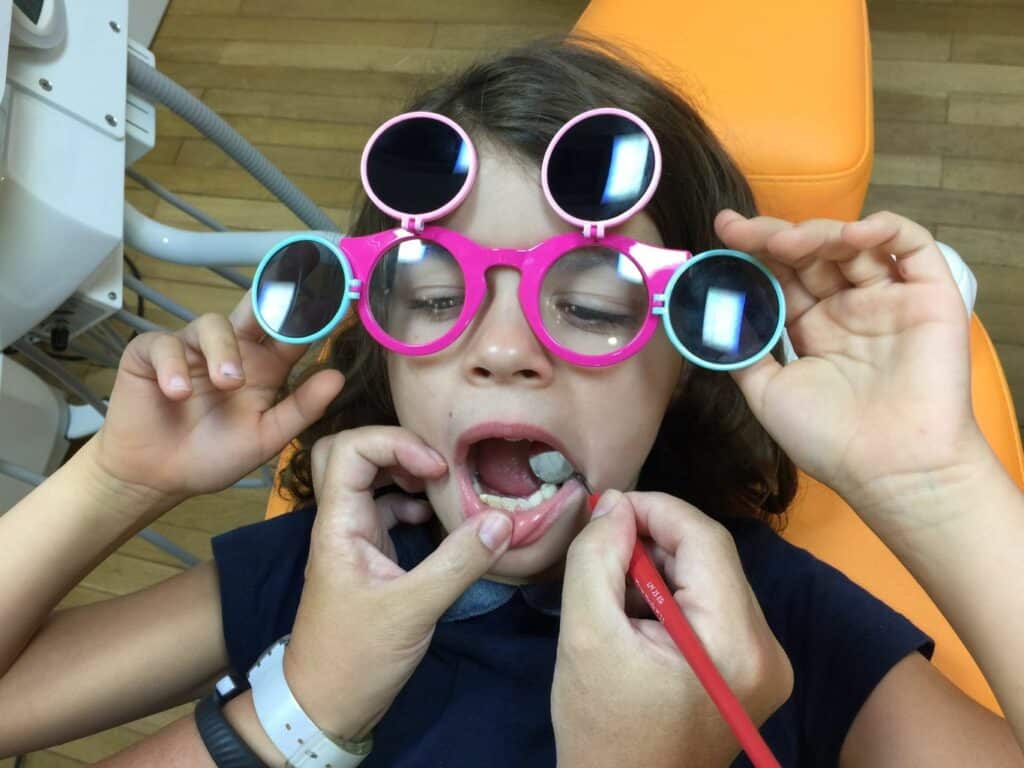Taking care of your teeth and seeing a dentist from an early age is essential for good oral health.
Children can get cavities on their baby teeth. Although these teeth are not permanent, it is important to take care of them and prevent cavities.
What is tooth decay?
A dental caries is a more or less important lesion of the tooth. It occurs when acids attack the hard surface layer of the tooth, called enamel.
These acids come from dental plaque. This plaque contains bacteria that grow thanks to the sugars brought by the food we eat. These sugars then produce acids that attack the enamel and therefore the surface of the tooth.
Initially on the surface, decay can over time form holes and cavities in the tooth. If left untreated, these cavities grow and eventually destroy the tooth completely.
Acids in the mouth are constantly attacking the surface of the teeth, but not all of them create cavities. This is due to certain elements that instead protect our mouth. Saliva is one of them, as it helps protect our enamel. Fluoride, which is a natural mineral, also helps strengthen teeth. Fluoride intake and good dental hygiene help prevent cavities.
Causes and symptoms of cavities on baby teeth
Causes of cavities in children
The early appearance of caries in young children is multifactorial.
Caries can be due to a bottle syndrome: if the child has the habit of drinking throughout the day or night a bottle with sweetened drinks, it can promote the appearance of carious lesions. Indeed, the teeth remain impregnated during several hours in a sugary bath which accelerates the development of the bacteria.
Too much intake of sweet solid foods can also accelerate the development of cavities.
Because baby teeth have very thin enamel, they are more fragile than permanent teeth. Poor oral hygiene also plays a role in the appearance of cavities.
Symptoms of cavities in young children
Regarding the development of dental caries, we can distinguish four stages:
- A slightly gray or yellow stain will appear on the surface of the tooth: it is the enamel that is affected. At this stage the cavity is not painful.
- The cavity has penetrated the surface layer of the tooth to attack the dentin. The first pains start to occur.
- Once the cavity has reached the dental pulp, i.e. the softer layer of the tooth, it will grow rapidly. It is at this stage that the severe pain occurs.
- More serious problems such as abscesses or even damage to the surrounding tooth tissue can occur if nothing is done at this stage.
Your child will start to feel pain in the second stage if he or she has cavities. If your child is in pain, don't delay taking him or her to the dentist.
As the cavity develops, the pain increases, and it may even prevent the child from eating properly.
Caries in young children develops primarily on the upper incisors.
Treatment and prevention of caries in baby teeth
Treating cavities on baby teeth
As soon as the first symptoms of a cavity appear on a baby tooth, it is essential to make an appointment with a specialized dentist.
If the problem is caught in time, a fluoride treatment can be considered to limit the development of cavities.
Establishing new eating and oral hygiene habits is also important to prevent the onset and development of cavities.
If the cavities are too extensive, an extraction under anesthesia can be considered. This type of operation can cause difficulties in chewing food, learning to speak or pronouncing.
The way to treat tooth decay on a baby tooth will depend on how advanced it is. Find out in detail what is treatment of a cavity in baby teeth.
Tips for preventing cavities in children
To limit and prevent the appearance of caries in babiesThese tips can easily be followed:
- Limit sugary foods and drinks. Sugar accelerates the growth of bacteria that attack teeth,
- Have your child drink plenty of water to get the sugar out of the mouth. In addition, water increases the amount of saliva secreted, which protects the mouth and teeth,
- Use a fluoride toothpaste and possibly a mouthwash depending on your child's age. Fluoride helps protect tooth enamel,
- Visit a children's dentist once or twice a year to have your teeth thoroughly cleaned and checked for cavities.
Why is it important to treat a cavity in a baby tooth?
The appearance of a cavity in a baby tooth should be treated even if the tooth is not permanent. It is completely wrong to think that milk teeth are not important because they will be replaced by permanent teeth.
Indeed, milk teeth have a functional role, i.e. they are used for chewing and phonation. But they also have an aesthetic role.
In addition, the baby teeth help to ensure that the permanent teeth are properly established.
As soon as the first symptoms of tooth decay appear, you should consult a dentist to have it treated. A cavity can quickly spread to several teeth and become more and more painful. It is important to know that an infection on a baby tooth can cause significant damage to permanent teeth.
It is therefore essential to have your baby teeth treated if they are affected by cavities.




